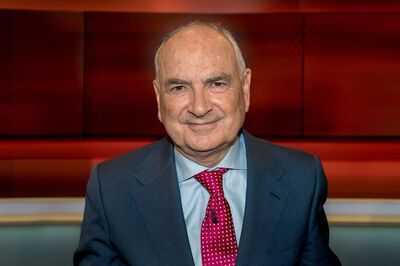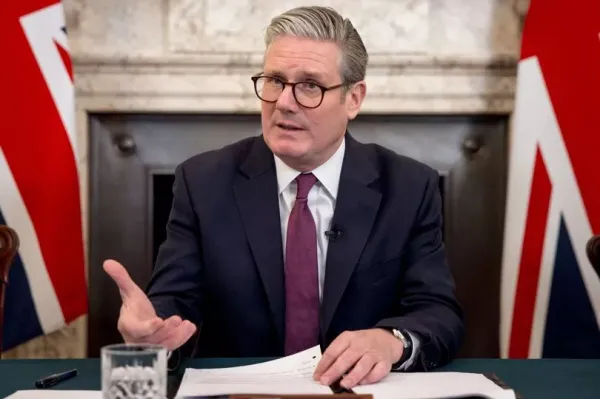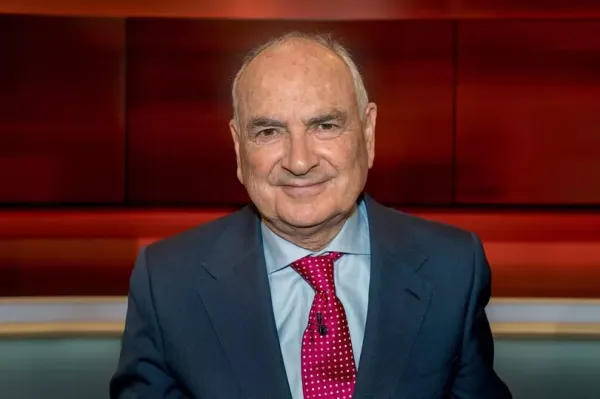
Donald Trump is ratcheting up the pressure on the UK and wants to force Downing Street to accept his , a group of experts have told The .
The decades-long "special relationship" between London and Washington after the US president slapped Britain with a "disappointing"on all British to America. While it may not seem as high as other nations, there are separate rates of 25 per cent on steel, aluminium and, most importantly, cars - the UK's biggest export to the US.
During what the President dubbed '', Trump ranted at the countries he claims have as he signed yet another executive order of . Trump's latest actions make it the leader appear to be hellbent on sparking a trade war across the globe.
READ MORE:
READ MORE:

While Britain's charge was minor compared to the 20 per cent slapped on the EU, the 34 per cent on , or the 49 per cent on Cambodia, Sir has warned that Trump's economic aggression will "clearly" have an impact on the British economy. His government has already issued sweeping cuts to public services to keep the country afloat.
The impact could easily drip down to average British consumers, who are already suffering with no end in sight to the rising cost of living. Trump's move is a way of forcing British industry to bow to his demands, which would be "politically toxic" for Keir Starmer at home.
The Mirror has spoken to a number of leading experts about what Trump's tariffs mean for us here in the UK.
Dr Andrew Wroe, Senior Lecturer in American Politics
In the lead up to Trump's big day, the UK government flew under the radar in the hopes of avoiding the president's ire. By all accounts, the government "will have been hoping for the best but preparing for the worst".
Dr Wroe explained: "There's probably relief inside No. 10 this morning, but little rejoicing. UK exports to our largest market will now be more expensive and therefore less attractive to American consumers. This will hit UK economic growth and make life even more difficult for the PM and the Chancellor."
One of the doctor's main concerns is the type of all-American products Trump wants seen stuffed on the shelves of British . Typically, US food products have lower quality standards and are often packed full of hormones, sugar and dangerous fats. He said: "And Trump wants some things that are politically toxic—hormone-stuffed American beef and chlorinated chicken on British supermarket shelves and American goods exempt from VAT are just non-starters for Starmer, as they were for previous British PMs. That's just one of the reasons why the post-Brexit trade deal with the US, nine years on, remains unsigned."
It's important to realise this is just the "first shot in a new global trade war", which will likely develop in intensity over the coming weeks and months, he added.
"While Sir Kier Starmer is unlikely to do anything hasty, the EU and China will almost certainly hit back quickly with retaliatory tariffs on US exports," the doctor said. "Will Trump then be forced to up the ante again? He might very well feel obliged to do so in order to appear strong. With each iterative move, global free trade is harmed and the post-war liberal consensus unravels.
"The UK government will probably continue to work behind the scenes, pushing for a bilateral trade deal with the US. However, both Starmer and Trump know that the US has the best hand, and a deal is unlikely to benefit both countries equally."
Professor Anthony Glees, British historian and political scientistDowning Street shouldn't be "rejoicing" escaping a 20 per cent tariff. This is the moment Sir Keir should be drawing up some "thick red lines" that Trump must not cross, according to Professor Glees, Emeritus Professor at the University of Buckingham. While the numbers may not be as bad as some other countries, Trump's actions have far more wide-reaching political repercussions.

Professor Glees explained: "I don’t think it could have been much worse for the UK. Yes a 10% hit feels less brutal than a 20% hit. But please note that our largest export to the US is cars & 25,000 UK jobs depend on our selling them to the USA. This is a heavy blow for the UK economy and mirrors totally the tariff on EU cars."
Starmer's next steps are incredibly important for how we'll feature in the global trade war, and Sir Keir needs to stand up to the president. He said: "What should we do next? I don’t think we should be cowed by Trump. He’s not the brilliant genius his supporters think he is.
"Think Gaza, think . Think the chaos in stock markets globally. I think it is right to keep talking but it’s still a tightrope. I would like to see Starmer lay down some thick red lines."
The professor advised Brits to watch this space to find out what the deal is that Starmer has been discussing with the president. Starmer said it'll be in the interest of the nation, but the professor's "great fear is that we will give away far too much in order to let our Government claim they’ve done a great job for us.".

He is also concerned about American products flooding the UK market, and how it could have a devastating impact on industry. He said: "Actually it’s not in our national interest to see UK farming destroyed by importing cheaper US food which Trump wants to dump on us and no one wants the big US media giants to trample all over our digital space. People like Musk and Zuckerberg are as rich as sin as it is, they should be taxed.
"Above all we need to regulate their output and hold them to account for the hateful and harmful content they spew out. Trump doesn’t want to let us do this. Starmer must not cave in or be seduced by cynical claims of a ‘special relationship’. These should be thick red lines."
Dr Thomas Gift, Associate Professor of Political ScienceDr Gift, who is also the Director of the Centre on US Politics at UCL, agrees that Starmer's next move is key for how the trade war will play out. He also believes that the UK will no longer be able to rely on the "special relationship" between the US and UK because Trump is an entirely different type of president, one who only cares about his bottom line.

He tells The Mirror: "The reality is that the UK needs the US more than the US needs the UK. Especially in the aftermath of , London needs to look to Washington now more than ever for economic partnership. The problem is that Trump places less emphasis on the “special relationship” - particularly as it applies to the common values that bind the nations together - because his foreign policy is almost entirely transactional.
"On the trade front, that means the UK can’t expect special favors and needs to craft its response in similarly transactional terms if it doesn't want its tariff rate to soar beyond 10% going forward. The UK has avoided the worse for now, but whether that lasts is in the hands of Starmer."
Dr Sam Edwards, Reader in Modern Political HistoryDr Edwards, an expert on UK-US relations at Loughborough University, believes Starmer and his cabinet have every reason to be pleased with the result, suggesting that the UK escaped the worst of it after weeks or a carefully-constructed diplomatic effort to keep unpredictable Trump on side.

He explained: "It could certainly have been worse for the UK as the 20 per cent tariffs levelled on EU neighbours makes abundantly clear. In some quarters this might be seen as a Brexit dividend, but I’m more inclined to see it as the consequence of the UK government’s sustained diplomatic offensive since President Trump took office in January.
"In an ideal UK negotiators might have secured an exemption for British exports, perhaps as part of a broader US-UK free trade agreement. But given the determination of the Trump administration to re-set the dial on global trade this was always unlikely, especially in the timescale allowed. At this specific juncture, therefore, the UK government has probably got the best result possible."
He believes we won't see any major diversion from the course of action that's already played out. But there will be a stronger push behind closed doors to secure a US-UK trade agreeement.
Dr Edwards said: "Since President Trump took office in January the UK government has maintained a steady diplomatic course: cultivate personal rapport (between President Trump and Prime Minister Starmer, and between Vice-President Vance and Foreign Secretary Lammy); focus in public on common goals and objectives (securing peace in Ukraine); and absolutely do not get drawn into mudslinging.
"In the grand scheme of things, this approach seems to have worked, and the sensible play now would be to continue on the course already set. Put another way: now is the time to take a breath, stay calm, work the back channels, and re-double efforts on securing a US-UK trade agreement of some description."